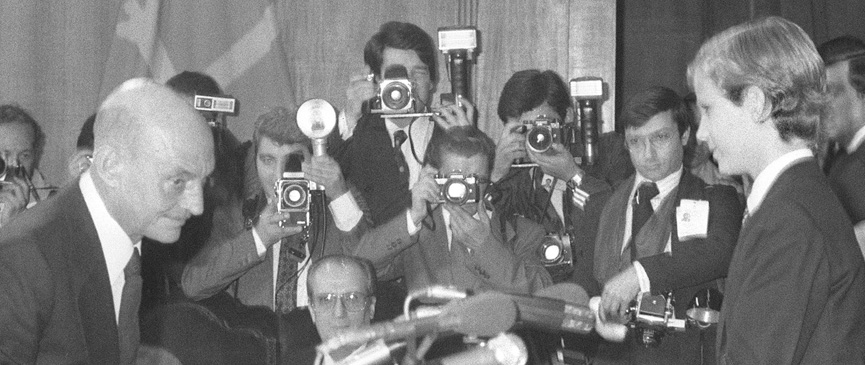You are in:
Laureates
Start of main content
José Hierro
Prince of Asturias Award for Literature 1981

Poet, scholar of poets, writer and art critic, José Hierro del Real (Madrid, España, 1922 – 2002) is one of the most personal voices of Spanish lyricism in the second half of 20th century. His work has had a constant, decisive influence on poetry written in Spain since in fifties. Belonging to a generation which bore the scars of the Civil War, his poetic creation represents the passionate defence of the individual in the face of hostile surroundings and his song is a response to attacks on liberty.
José Hierro spent his childhood years in Santander, a city with which he still has fond connections. There he saw the outbreak of war, there he published his first book of poems and there he began his basic education and his Bachelor of Engineering degree, which he would have to interrupt in 1963. Art attracted him from the beginning. First came theatre and mime, taking part as director and actor in various amateur groups. He also started writing, and at the age of twelve received a prize from the Santander Athenaeum for a children's tale. His reading in his early years was the same as that of any Spanish child of those days, although he did not take long in making personal discoveries. Rubén Darío, Juan Ramón Jiménez and the poets of '27 - whom he discovers in the Anthology of Gerardo Diego -, become his masters. He also begins to read Spanish classics, especially Lope de Vega, French poetry (Baudelaire was to become one of his favourites), and all kinds of narrative: Dickens, Dostoevsky, Marcel Proust...
The poetic activity of José Hierro began, as an enthusiast, during the Civil War. This is the period when he makes his first literary friendships, establishing relationships with a group of well-established painters, such as Gutiérrez Solana, Cossío and Quirós, whose literary gatherings he attends. At than time he met the poet José Luis Hidalgo, with whom an intimate friendship began, and Gerardo Diego, meeting whom was to be especially significant for him and for his poetry.
The war separated José Hierro from his studies. The events of this period are to remain in a veiled form in some verses of the poem "Historia para muchachos". The adolescent Hierro was on the point of being evacuated - waiting for a boat which never arrived - and was detained and tried for "aiding or joining the rebellion". Sentenced to prison, he entered the Santander Provincial Gaol in 1939, and would not be released until early 1944. During his years in prison he wrote a lot, learned to read music with his companions and managed to organise and conduct a choral group.
Once at liberty, after a brief spell in Santander, he moved to Valencia, where he worked in various jobs and made contact with a series of writers who stimulated his lyrical sense. These are years rich in experience of life and in work of poetic creation. In 1946 he returned to Santander and established a relationship with the founding group of the journal Proel, in whose collection his first book, Tierra sin nosotros would appear in March 1947. Shortly afterwards he won the Adonais Award with his second work, Alegría (August 1947), becoming one of the most representative poets of the young lyricism of the moment. Since then he was to figure in every anthology compiled within Spain and abroad. Later, Con las piedras, con el viento (1950), Quinta del 42 (1953), Cuanto sé de mí (1958) and Libro de las alucinaciones (1954) appear. In 1962 his Poesías completas were published. In 1989, under the title Carpetas poéticas, with screen-prints by Salvador Victoria, a series of previously unpublished poems, belonging to the unfinished work Agenda, were published.
Adoptive son of Santander, and decorated by the Menéndez Pelayo University, José Hierro obtained the National Literature Award in 1953, the Critics Prize in 1958 and 1965 and the National Award for Spanish Letters in 1990. Elected to the Royal Spanish Academy (RAE) in 1991, he was awarded an honorary degree by the Menéndez y Pelayo International University, Santander, in 1995. He received the Miguel de Cervantes Prize in 1998 as the definitive recognition of his magnificent career.
End of main content
Sección de utilidades
Fin de la sección de utilidades
- Legal document Legal document (Access key 8)
- | Privacy policy Privacy policy (Access key )
- | Social networks ???en.portal.pie.menu107.title???
- | Cookies ???en.portal.pie.menu110.title???
- | Site map Site Map (Access key 3)
- | Contact Contact (Access key )
- | XHTML 1.0
- | CSS 2.1
- | WAI 'AA
© Copyright 2024. FUNDACIÓN PRINCESA DE ASTURIAS



